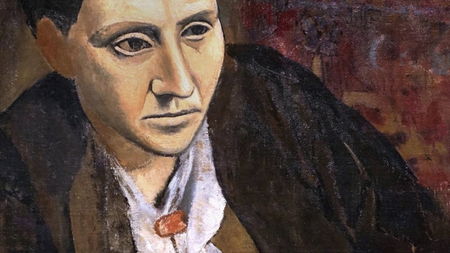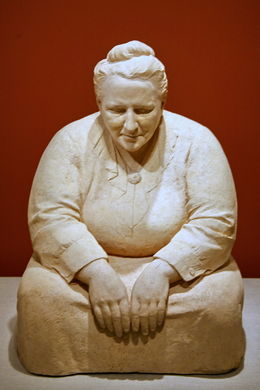Gertrude Stein: Difference between revisions
imported>Pat Palmer (→Other popular quotes from Gertrude Stein's work: adding two quotes to be explored later) |
imported>Pradyumna Singh (→Least famous work: corrected unsupported claim. It may well be true but we cant say that yet) |
||
| Line 10: | Line 10: | ||
== Least famous work == | == Least famous work == | ||
Stein's | Stein's last work was published posthumously in 1947 and was entitled ''Four in America''<ref>''Four in America'' was published in 1947 by Yale University Press. The book includes a 26-page introduction by playwright [[Thornton Wilder]].</ref>. As of 2020, ''Four in America'' is out of print, has never been digitized, and is likely to be found in only two or three libraries in the United States<ref>A copy of ''Four in America'' exists in the Philadelphia Free Library, and also in the Princeton University Library</ref>. Even used copies via the internet are difficult to come by. The book consisted of four sections, purporting to be about “Wilbur Wright”, "Grant", “Henry James” and “George Washington”. | ||
''Four in America'' is now noteworthy because a single sentence of it has been widely misquoted and misinterpreted multiple times on the internet, all without any reference to its actual source. Internet quotes claim that Stein said she "admired Ulysses S. Grant". Others claim that Stein said she could not “think of Grant without weeping”. The actual sentence Stein wrote is to be found in the quarter of ''Four in America'' allegedly about Grant, on its last page, and the sentence reads: “I cannot think of Ulysses Simpson Grant without tears.” But do not be deceived; this sentence perches atop one of the most abstruse, dense, and discouraging paragraphs ever written in the English language: | ''Four in America'' is now noteworthy because a single sentence of it has been widely misquoted and misinterpreted multiple times on the internet, all without any reference to its actual source. Internet quotes claim that Stein said she "admired Ulysses S. Grant". Others claim that Stein said she could not “think of Grant without weeping”. The actual sentence Stein wrote is to be found in the quarter of ''Four in America'' allegedly about Grant, on its last page, and the sentence reads: “I cannot think of Ulysses Simpson Grant without tears.” But do not be deceived; this sentence perches atop one of the most abstruse, dense, and discouraging paragraphs ever written in the English language: | ||
Revision as of 10:39, 5 February 2021
Authors [about]:
join in to develop this article! |

Gertrude Stein (1874 - 1946) was an American author who lived in Paris, France, and is best remembered for hob-nobbing with several famous writers and artists while living in Paris, and for creating deliberate linguistic conundrums. Anyone wanting to know about Gertrude Stein's childhood, education, or what she liked for dinner, is welcome to hop over to Wikipedia and find it out there. They'll also have a list of the famous writers and artists who attended her salon, and fill you in on her personal life, including her sexual orientation (as if that has anything to do with anything literary). But I focus here on the widespread difficulty people have in reading Stein: they simply don't know what to make of what she wrote. This phenomenon is so strong that even English literature majors in college have often never been required to read a single work by Stein. It seems that Stein is a much talked about and seldom read writer.
Most famous work
Stein's most famous work was a best seller published in 1933, The Autobiography of Alice B. Toklas, and it shows early traces of the kind of confounding language that has caused Gertrude Stein to be remembered nearly a century later.
Least famous work
Stein's last work was published posthumously in 1947 and was entitled Four in America[1]. As of 2020, Four in America is out of print, has never been digitized, and is likely to be found in only two or three libraries in the United States[2]. Even used copies via the internet are difficult to come by. The book consisted of four sections, purporting to be about “Wilbur Wright”, "Grant", “Henry James” and “George Washington”.
Four in America is now noteworthy because a single sentence of it has been widely misquoted and misinterpreted multiple times on the internet, all without any reference to its actual source. Internet quotes claim that Stein said she "admired Ulysses S. Grant". Others claim that Stein said she could not “think of Grant without weeping”. The actual sentence Stein wrote is to be found in the quarter of Four in America allegedly about Grant, on its last page, and the sentence reads: “I cannot think of Ulysses Simpson Grant without tears.” But do not be deceived; this sentence perches atop one of the most abstruse, dense, and discouraging paragraphs ever written in the English language:

|
I cannot think of Ulysses Simpson Grant without tears. He was so what shall it be not by any night not by any day not by any light not by any way, but Ulysses Simpson Grant, which one is, that one is, who can come that one can come, for which they come not of for which they come but they can in that case but which they can in that case can place, I place him there. Do you too. Do you two place him there which do you do. I do I place him there. I which I place him there, not only for me to be me, I am an American which if which I can be only I know, I know all about sitting and standing but I do not sit and stand in the way not yet nor has been. From Four in America, page 81, by Gertrude Stein (1947). |
To make any sense of the paragraph quoted above, it is helpful to resort to Four in America's 26-page introduction by Thornton Wilder, in which he provides an explanation for Stein’s mangled, rebellious and challenging use of language. Per Wilder, Stein believed that we are now living in “end times” where language has become superficial in effect, and normal use of language does not reach the real person inside each of us. Thus (surmises Wilder), Stein tried a variety of unorthodox mechanisms to cut through our mental fog, to make us sit up and think differently, to jar us out of complacency, to challenge what we really know. Possibly, to want to read this book, wrote Wilder, requires a kind spiritual readiness.
Besides the realization that anyone claiming truly to know what Gertrude Stein thought of Grant would be stretching the truth substantially, readers can benefit by innoculating themselves against quotes thrown around glibly on the internet without an actual reference to the specific source.
Other popular quotes from Gertrude Stein's work
“A vegetable garden in the beginning looks so promising and then after all little by little it grows nothing but vegetables, nothing, nothing but vegetables.”
"Let me listen to them and not to them."
“Whenever you get there, there is no there there.”
“Nothing is really so very frightening when everything is so very dangerous.”
“It takes a heap of loafing to write a book.”
“Let me listen to me and not to them.”
"A rose is a rose is a rose is a rose."
“There ain't no answer. There ain't gonna be any answer. There never has been an answer. There's your answer.”
Notes
- ↑ Four in America was published in 1947 by Yale University Press. The book includes a 26-page introduction by playwright Thornton Wilder.
- ↑ A copy of Four in America exists in the Philadelphia Free Library, and also in the Princeton University Library